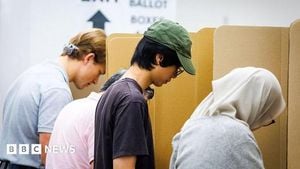The Ministry of Culture and Strategic Communications of Ukraine has designated Nikita Dzhigurda, the Russian actor and singer, as a threat to the national security of Ukraine. This decision was officially published on January 30, 2025, as part of its efforts to bolster national security amid continuing tensions with Russia.
According to the ministry's announcement, Dzhigurda, born on March 27, 1961, was added to the list of individuals posing risks to the country due to his repeated visits to the conflict zones of Donbass and Zaporizhzhia. Reportedly, during these visits, he performed for Russian military forces and provided them with various forms of assistance. This active participation with military personnel has drawn the ire of Ukrainian authorities, prompting the inclusion of his name on the list.
The Ukrainian government has maintained such lists since 2015, regularly updating them with individuals from the Russian entertainment sector who are believed to undermine Ukraine’s national interests. Among the hundreds of individuals already on the list are various prominent figures from Russia’s cultural sphere, reflecting the government's strategy to counter perceived threats stemming from the entertainment industry.
The decision to designate Dzhigurda is reportedly backed by specific laws, particularly referencing parts of Ukraine's media law, which allows such actions against individuals deemed detrimental to the state. This includes not just entertainers but also anyone involved with anti-Ukrainian efforts.
Responding to his inclusion, Dzhigurda expressed pride, stating, "I deem the inclusion of my name on the list of artists representing a threat to the Nazi regime now governing Ukraine as a worthy reward." He noted his roots, claiming to have been born in Soviet Ukraine, and emphasized his longstanding support for Russia, particularly after events such as the tragic incidents during the 2014 Odessa protests. Speaking to RTVI, he reiterated his commitment to the Russian military and ideology, underscoring his controversial stance amid growing divisions between Ukraine and Russia.
Despite the intense rhetoric, Dzhigurda’s actions, including concert performances and humanitarian aid deliveries to Russian troops, have positioned him as both a cultural figure and provocateur. He boasted of having visited the contested areas numerous times, stating he has directly supported the military personnel engaged there.
Notably, Dzhigurda’s inclusion on this list does not occur in isolation; the risks associated with entertainers and cultural figures during tumultuous political climates often amplify their influence. By labeling such individuals as threats, Ukraine aims to deter any potential propaganda or cultural support for Russian military actions. This tactic reflects broader strategies seen worldwide where governments seek to regulate cultural narratives and the messaging surrounding international conflicts.
Further complicate matters, Dzhigurda's activities have not only been criticized by the Ukrainian government but have also led to significant consequences for his career. His previous expulsion from the Ukrainian Film Union and subsequent listings on databases like the Myrotvorets database (Peacekeeper) underline the broader social and political repercussions he faces within Ukraine.
The Ministry of Culture's announcement indicates the significant and far-reaching effects of the war on cultural diplomacy and individual careers. Dzhigurda, who has straddled both artistic and military support, exemplifies how artists can become embroiled in national discourses, often paying personal prices for their public stances.
By adding his name to the national security list, Ukraine not only seeks to protect its sovereignty but also sends a strong message about its intolerance for any form of perceived betrayal or violence represented through cultural figures. Dzhigurda’s case will likely resonate with debates surrounding the role of art and expression amid conflicts, especially as the situation continues to evolve.
While the artistic community grapples with the harsh realities of politics, the long-standing dynamics and historical connections between the two countries will undoubtedly influence future interactions, both at home and abroad. The ramifications for Dzhigurda serve as both warning and example within this complex cultural backdrop.



